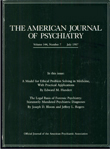Physical Health, Depressive Symptoms, and Managed Care Enrollment
Abstract
OBJECTIVE: This study used a national employee survey to test the hypothesis that symptomatic individuals in general, and individuals with depressive symptoms in particular, are disproportionately enrolled in fee-for-service health care plans as compared to health maintenance organizations (HMOs). METHOD: The study analyzed data from the 1993 Employee Health Care Value Survey, a questionnaire distributed to employees of three large corporations. The sample comprised 20,283 employees covering six U.S. geographic regions and 46 health plans. The authors used logistic regression to model the association between HMO enrollment and presence of physical and depressive symptoms, measured by subscales derived from the Medical Outcomes Study 36-item Short-Form Health Survey, adjusting for health, demographic, and insurance variables. RESULTS: In unadjusted models, enrollees in fee-for-service plans had higher rates of both depressive and physical symptoms than HMO enrollees. After adjustment for age alone or for age and other potential confounders, there was no difference in physical symptoms between plan types. However, individuals with high levels of depressive symptoms were 16% less likely to be enrolled in HMOs than in fee-for-service plans after adjustment for age, other demographic variables, physical health status, and insurance characteristics. CONCLUSIONS: This study provides evidence that symptomatic individuals are more likely to be enrolled in fee-for-service plans than in HMOs. While much of the effect for physical symptoms may be explained by differences in demographic variables, particularly age, the difference in depressive symptoms appears to be independent of those variables. (Am J Psychiatry 1998; 155:878–882)



